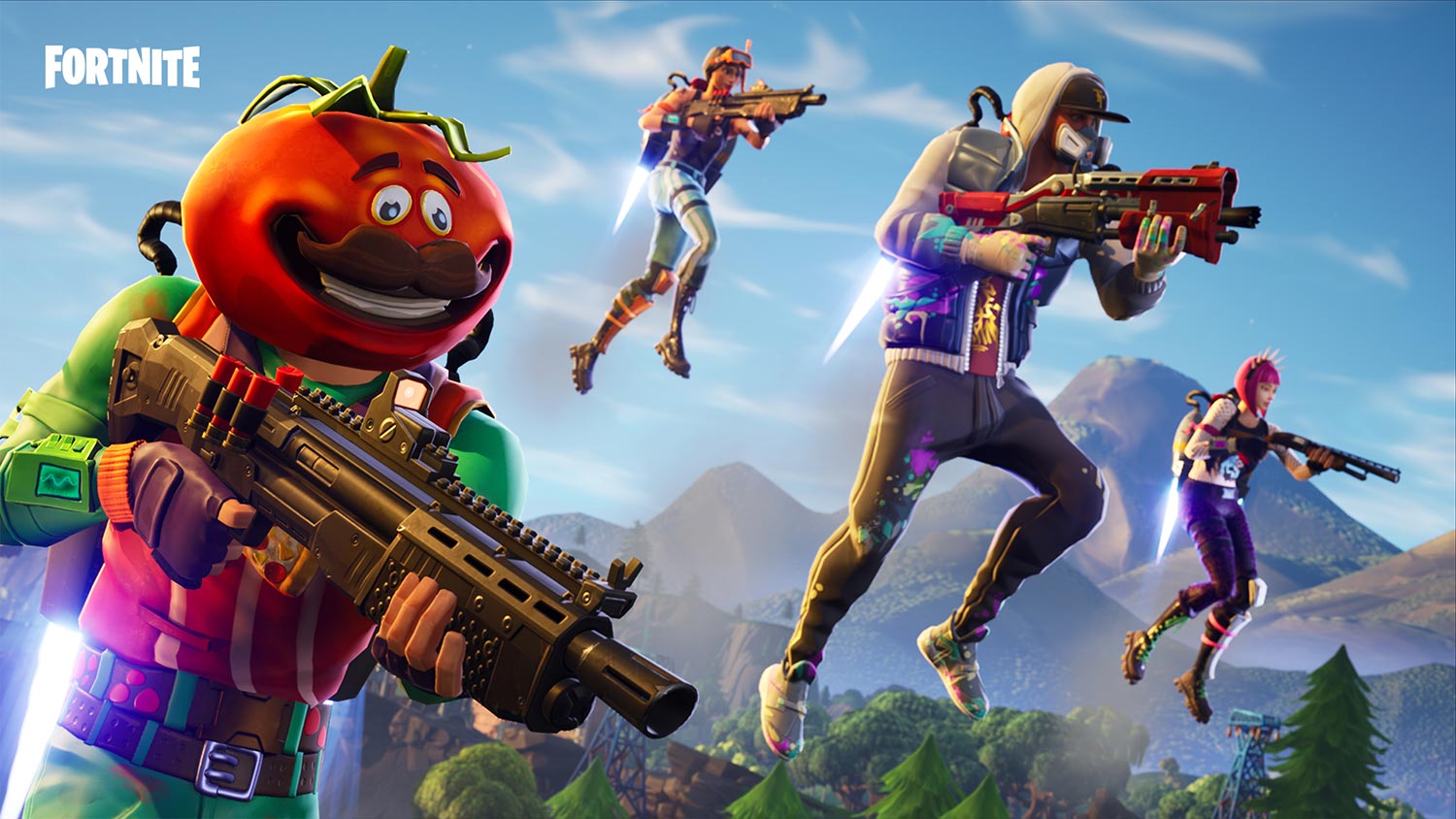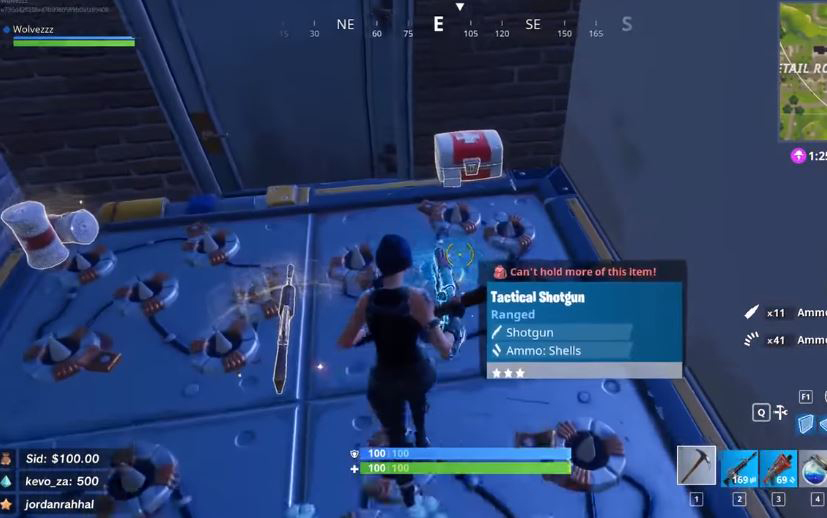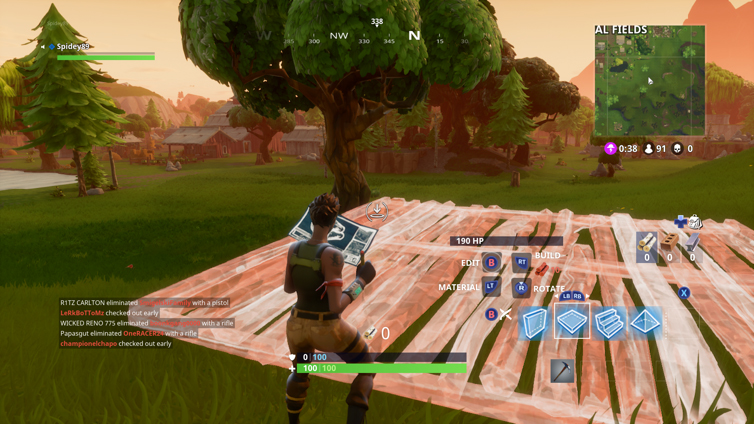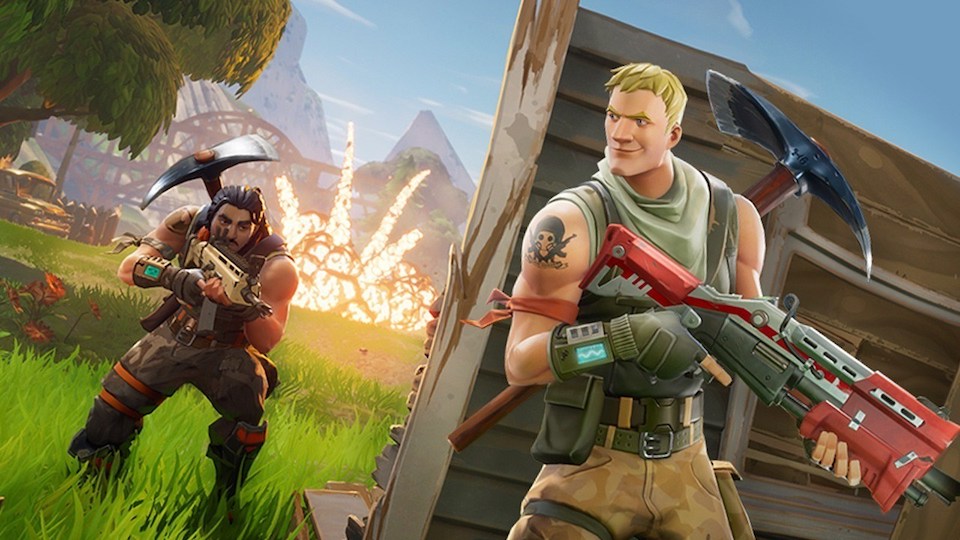If there's one thing you should know about Fortnite as a parent, it's that you shouldn't let your kid play with voice chat on.

I heard about 50 F-bombs during the course of one game, many of them about my playing ability. There are also no filters of any kind to keep players from saying (or typing) whatever they want to each other.
But that doesn't mean Fortnite is necessarily bad for kids, especially if you use the right in-game tools and properly monitor their play.
Here's what parents need to know about this game.
- Fortnite is an online shooter that starts with 100 players and leaves one winner standing.
- The entire point of the game is to kill other players, but the violence is cartoon-like.
- Although the game itself seems pretty harmless, players can talk and type whatever they want to each other, and bad language is rampant.
- In-app purchases can turn this free game into an expensive habit, with the average player spending about $85.
- Short matches and accessible gameplay make the game addictive.
- You can regulate your child's playtime (as well as in-app purchases) via parental controls on platforms like PS4, Xbox One, Switch and iOS.
- If your child is showing signs of isolation or depression because of the game, seek professional help.
What is Fortnite Battle Royale?
Fortnite Battle Royale is an online third-person shooter game in which 100 players parachute onto an island, and the last player alive wins. Each game lasts about 20 minutes (although you have the option to leave the game if you die, so if you aren't very good, games can be very short!).

Even though it was released less than a year ago, Fortnite Battle Royale already boasts 125 million players, according to its publisher, Epic Games.
While there are two different Fortnite games at the moment, we're going to focus only on Fortnite Battle Royale, since that game is free and is the one that most people are playing and talking about.
MORE: Fortnite for Dummies - Why It's Taking Over the World (And How to Jump In)
Is there anything that should concern parents?
The game is violent — it is a battle to the death, after all — but the violence is bloodless and rather cartoon-like. There's just lots of shooting and hacking and noise.

Although the game is free to play, in-app purchases can add up quickly. Players can buy things like new looks and new dances, and while these purchases don't affect a player's chances of winning, one of my friends told me that her son has spent more than $200 in the game. Most platforms allow you to block in-app purchases via parental controls (see paragraph below), so be sure to set up yours if you don't want junior running up the credit card bill.
There are both voice-chat and text-chat capabilities within the game, but not with solo play. You can turn off voice chat in the game's settings but your child could just turn it on again. You may be able to turn off all voice chat within the device itself using parental controls, but it's different for every platform.
MORE: How Much Fortnite Is Too Much for Kids?
Most parental control settings will allow you block the game completely. Macs, PCs and Xboxes, iPhones/iPods, Nintendo Switch and PS4s all have some version of parental controls.
Can other players talk to your child?
Text chat cannot be turned off, and there are no filters for voice or text, which may be concerning to parents. There's nothing to stop an adult from saying lewd things to a younger player, or to stop kids from swearing at each other.

Now, you can report players from within the game by clicking on "Report Player" in the bottom right of the screen if you think they've crossed a line or cheated, or after the game (just make sure you remember their player name!). Players can also mute individual players, so if your child is hearing things he knows he shouldn't, he can make it stop.
When I played with voice chat on, there was a lot of swearing. Usually it was the adults swearing, but when I ended up on a team with one other adult and two very young-sounding children, it seemed like the kids were getting a kick out of swearing when grown-ups could hear.
I spoke with Lewis Ward, a research director with International Data Corp. who studies gaming and VR/AR, who told me that the only way to stop the bad language in Fortnite was to turn chat off.
MORE: Fortnite's Playground Mode Is Here: What You Need to Know
"If there's a way to stop teens or adults from swearing and trash talking in a game I don't think anyone's found it yet," Ward said.
What makes Fortnite so addictive?
I played a good amount of Fortnite myself while preparing for this assignment, and while I'm not a gamer and don't usually have any trouble staying away from things like this, I found myself on multiple occasions playing "just one more game."

Since the games are short, it was easy to trick myself into thinking that it wasn't eating up that much time, and since you would never want to just leave in the middle of a game, putting a time limit on it is a bit harder than for a game that just continues on without end.
Ward told me that making addictive games is an art form, and that Epic knows what it's doing — the company has been around the block a few times.
"Epic does a good job releasing weekly updates to keep the gameplay fresh. There's just a lot of things that go into it. There's skill involved but it isn't too hard for noobs to pick up the basics and have fun."
How can I control my child's playtime?
While some children have developed the ability to self-regulate how much Fortnite they play, an informal poll of my friends indicates that that's not usually the case.

If you need to put limits on how much your time your child is spending on the game, there are several ways to do that (aside from just kicking the child off the device). With the exception of iPhones/iPods, all of the parental controls listed above include instructions for limiting how long the device can be used, allowing you to set a hard limit on how much time your child has with Fortnite (or any game).
MORE: Fortnite Is On the Switch! How to Get It Now
For iPhones, the new Screen Time feature in iOS 12 will allow parents to impose usage limits on their child's iPhone through Family Sharing. For devices that need Wi-Fi to get online, it may be easier to handle time limits at the router level with something like Circle, which can put time limits on categories such as "games."
How does Fortnite affect the children who play it?
I spoke with Dr. Anthony Rao, a pediatric psychologist and author of "The Way of Boys: Promoting the Social and Emotional Development of Young Boys." He was not at all alarmed about the game itself, which he considers to be fairly benign as far as video games go. He was much more concerned with screen time in general, and how it affects individual children.

"I tell parents, don't fight with your kids about the game itself – don't tell them it's bad or it causes problems, because that just lowers the credibility of the parent," Rao said. "The thing I want parents to know about is the overall screen-time exposure. That's what's interrupting the healthy daily living. [Game-playing time] is time that would have been used to play and explore and meet up with friends."
When I asked Ward what parents can do if their kids are addicted to Fortnite, he sent me to the World Health Organization’s recent categorization of gaming disorder as a diagnosable condition, and he was only half kidding.
"Addictions are hard to break but the key is finding one or more other positive interests or hobbies they have and nudging them in that direction firmly but lovingly," Ward said. "You don't just restrict access and yell at them."
MORE: Fortnite's Mysterious Meteor: What You Need to Know
A high school teacher (who wished to remain anonymous) told me that the accessibility of Fortnite (being free to play) has managed to get Fortnite into her classroom, making it even harder to grasp students' attention. This teacher is a gamer, so she understands the hype, but she's caught students using their laptops to watch Twitch streamers play Fortnite, when the students were supposed to be working on assignments.
How do I know if my child is playing too much Fortnite?
Rao has nine warning signs that can help indicate if your child is playing Fortnite (or any game) too much, in order from mild to extremely concerning.

These include the game becoming the child's default downtime activity (rather than, say, going outside) as well as your child not turning the game off when asked. Rao also notes that your child may become agitated when you limit their play time, and that their addiction to the game makes them more impatient and prone to frustration.
Other urgent signs include your child becoming more sedentary and playing outside less. But according to Rao, the most dangerous signs are your child becoming more isolated, and showing "aggression and depression at clinical levels."
MORE: Fortnite Is Getting Jetpacks: What You Need to Know
Rao stressed to me that if a child exhibits the last three behaviors, you should seek professional help for the child immediately.
Bottom line
So, is Fortnite safe for kids? With the right supervision, it can be.
While the actual content of the game is inoffensive, you'll need to take the proper steps to make sure your child isn't exposed to the potentially lewd language of other players by keeping them in solo mode or ensuring that they're teaming up with friends. And be sure to take advantage of parental controls on your platform of choice to ensure that junior isn't playing through the wee hours (or racking up your credit card).
Like any online game, Fortnite can even be a positive social activity that keeps kids connected to their pals — not to mention a great potential bonding experience if you choose to play with your child. Just be mindful of screen time and monitor that chat, and your little one will have a safe environment for racking up those victory royales.
Sign up to get the BEST of Tom's Guide direct to your inbox.
Get instant access to breaking news, the hottest reviews, great deals and helpful tips.

Amy is a blogger, actor, singer and baker based in the US. She founded her own blog and also works a podcaster discussing parenting, real estate and, of course, the latest family-friendly tech trends. She also loves to spend time outside in the yard working on her garden. She's a mom to a teenage daughter and adult son and currently lives in Brooklyn with her husband. Her work has appeared in websites including Laptop Magazine, Redbook, Motto, Garnet News, and NJ Family.
